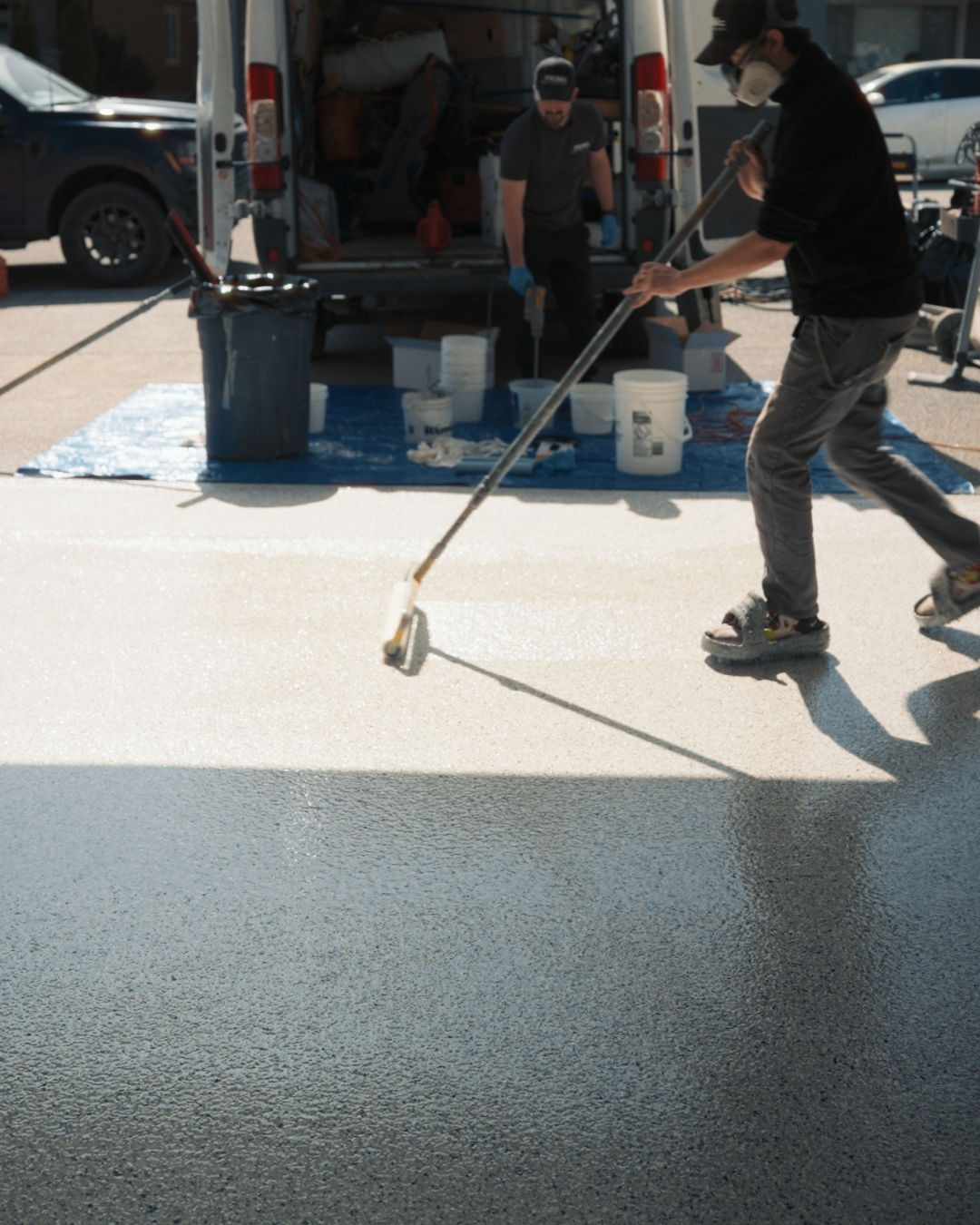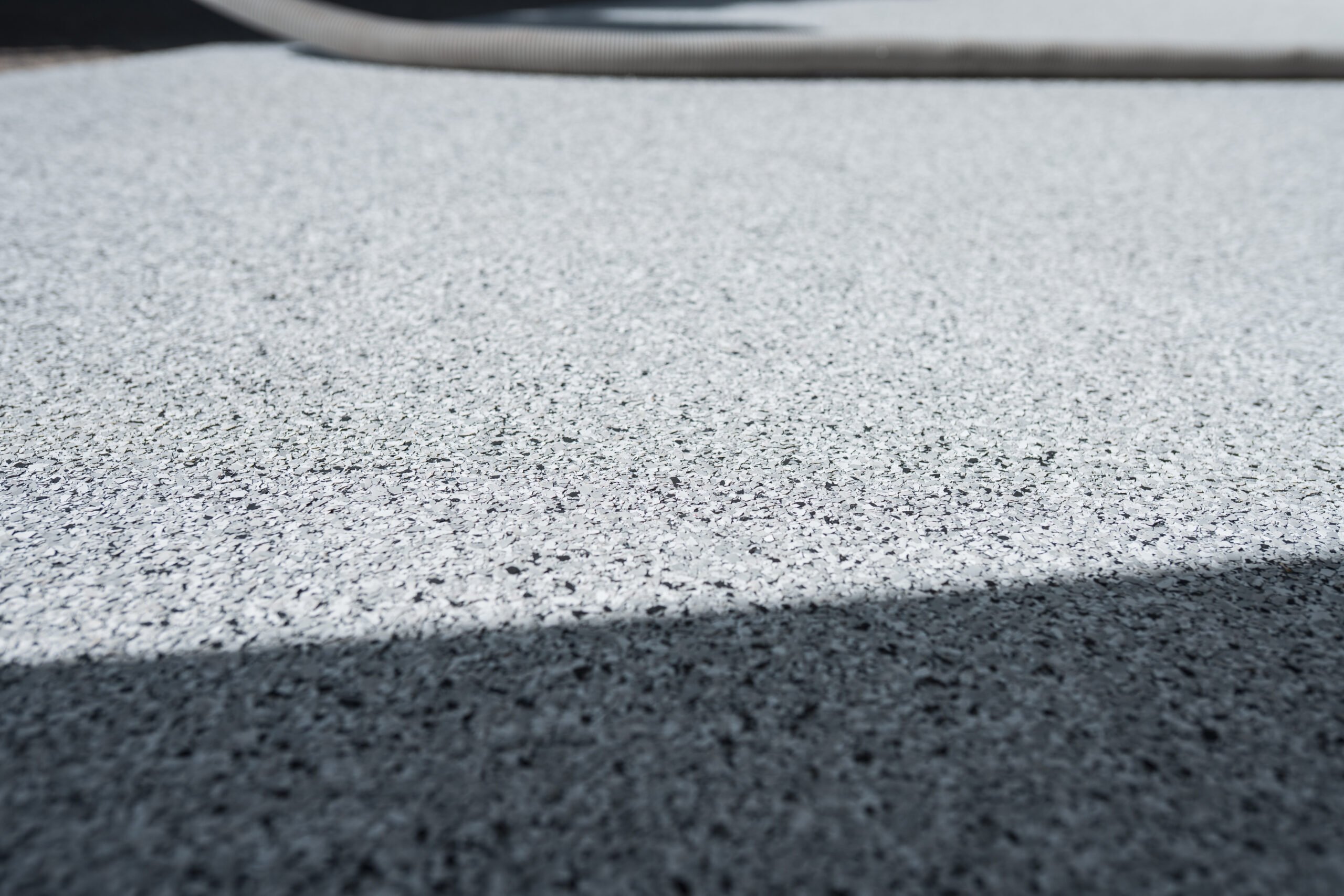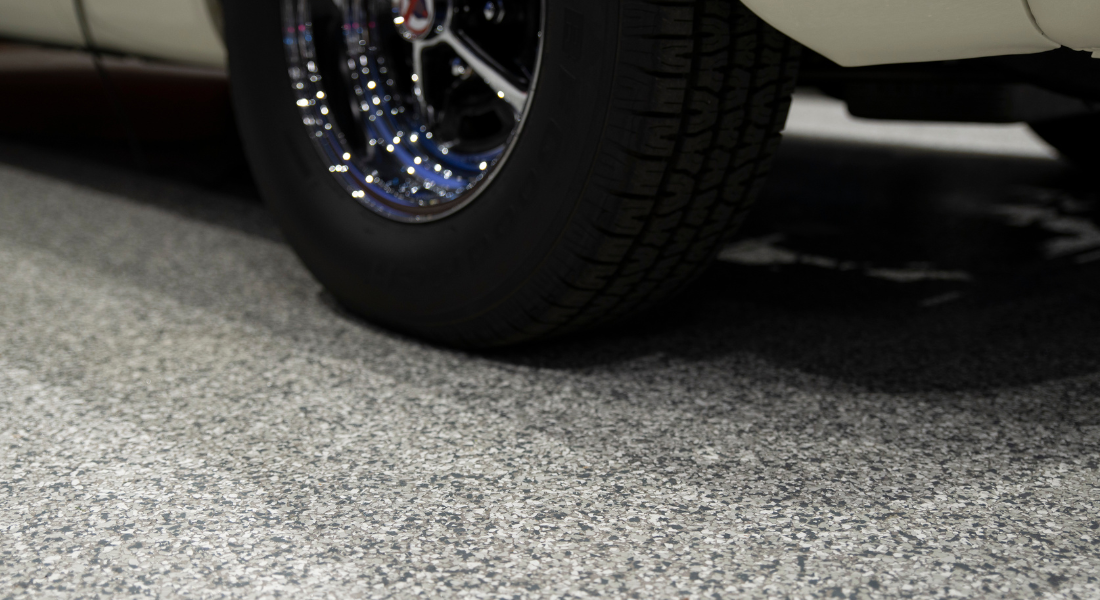So your garage floor has seen better days — stained, chipped, or just plain boring? At Prime Concrete Coatings, we believe your garage deserves the same care and beauty as the rest of your home. That’s where garage floor epoxy coating comes in — an innovative, durable solution that transforms dull concrete into a sleek, high-performance surface.
Whether you’re considering a fresh upgrade or looking to understand how epoxy compares to other coatings, this guide walks you through everything you need to know — including facts, expert tips, pros and cons, and real-world examples from our projects.
What is Garage Floor Epoxy Coating?
Garage floor epoxy is a two-part resin system consisting of epoxy resin and a hardener. When combined, they chemically bond to concrete, creating a rigid plastic surface that’s incredibly strong, resistant to wear, and visually appealing.
Unlike basic paints or sealers, epoxy doesn’t just sit on the surface — it penetrates and bonds with the concrete slab. This creates a seamless finish that’s built to endure everything from oil spills to heavy vehicles.
Benefits of Epoxy Coatings for Garage Floors
Why are so many homeowners upgrading to epoxy floors? Here’s what makes them a game-changer:
- Durability: Epoxy is 3x stronger than concrete alone.
- Chemical resistance: Oil, gasoline, cleaners, and road salts won’t break it down.
- Easy to clean: A quick sweep and mop, and you’re good to go.
- Moisture resistant: Protects against spills, floods, and humidity.
- Custom appearance: Choose from metallics, flakes, matte, gloss, and more.
According to The Spruce, epoxy coatings can last 10 to 20 years in residential garages with proper care — that’s an impressive ROI for your floors.
Why Choose Epoxy Over Paint or DIY Coatings?
Let’s face it — not all floor coatings are created equal. Many homeowners are tempted by DIY garage paint kits, but those don’t offer long-term protection or curb appeal.
| Feature | Epoxy Coating | Garage Paint | DIY Kits |
|---|---|---|---|
| Bond Strength | Chemically bonds to concrete | Sits on top | Inconsistent |
| Durability | 10–20 years | 1–3 years | Varies |
| Resistance | Chemicals, abrasion, and moisture | Limited | Low |
| Finish Options | Metallic, flake, gloss, matte | Few | Few |
| Installation | Professional expertise | DIY | DIY |
| Cost | $$$ | $ | $ |
At Prime Concrete Coatings, we use 100% solids commercial-grade epoxy, not the watered-down kind found at big-box stores. That means a thicker, stronger, and longer-lasting finish.
Types of Epoxy Coatings for Residential Garages
There are multiple epoxy formulations, each with distinct strengths. Here’s a quick breakdown:
- Water-based epoxy: Easier to apply but less durable. Good for light-duty residential use.
- Solvent-based epoxy: Stronger adhesion, but emits more fumes during application.
- 100% solids epoxy: The industry gold standard — thick, durable, and perfect for high-traffic garages.
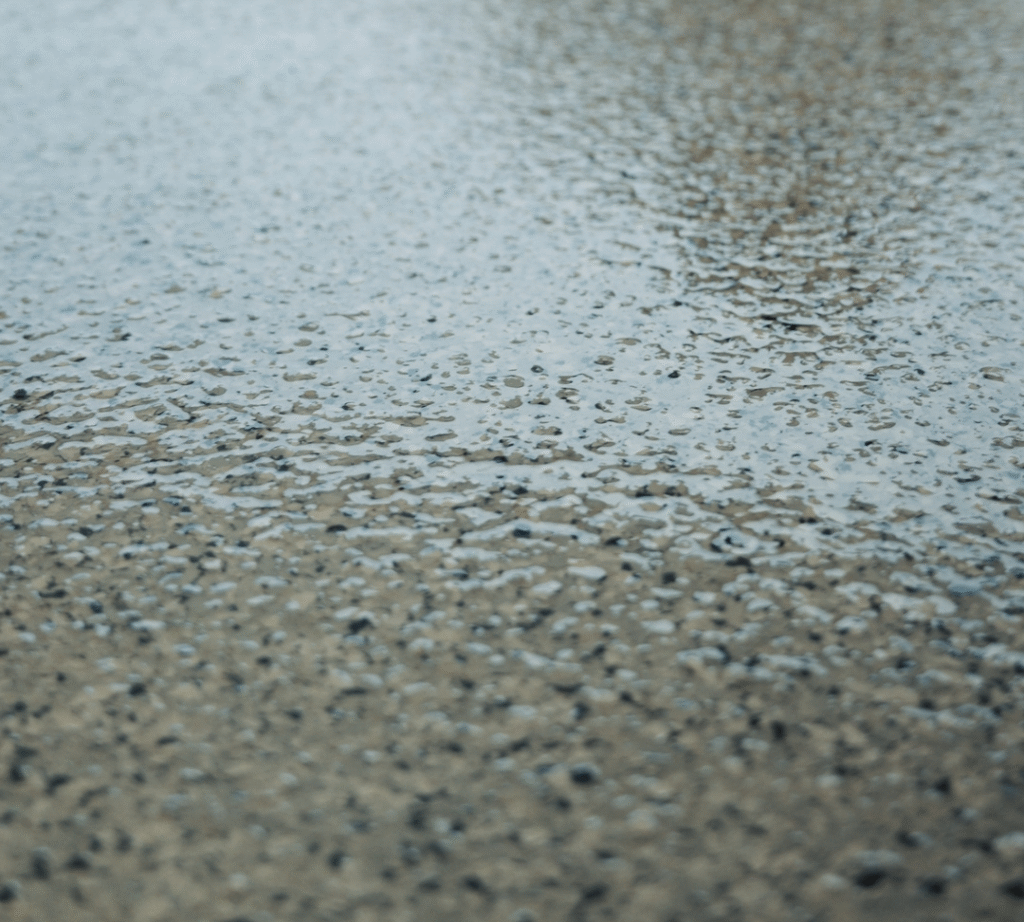
We always recommend 100% solids epoxy for long-term performance — and yes, it’s the only type we install.
Prime Concrete Coatings’ Proven Process
We don’t just slap on a coat and call it a day. Our trained professionals follow a multi-step system that ensures longevity and a superior finish:
- Site inspection & moisture testing
- Mechanical grinding for surface preparation
- Crack and joint repair
- Primer coat application
- Decorative flake or metallic coat
- Topcoat sealing with UV and chemical resistance
Our team ensures every detail is prepped, cured, and protected — because a great coating starts with great groundwork.
Ideal Conditions for Applying Epoxy Coating
Timing is everything. Epoxy coatings need:
- Temperatures between 13°C to 29°C.
- Low humidity (<85%)
- A dry concrete surface
That’s why spring and fall are often the best seasons for installation, though we adjust our process for year-round applications.
Surface Prep: The Make-Or-Break Stage
Don’t underestimate surface preparation — it’s the #1 factor in long-term success.
We use diamond grinding, not acid etching, to open up the concrete pores and remove contaminants. This ensures the epoxy physically locks into the surface, preventing peeling or bubbling later.
How Long Does It Take?
While each project varies based on size and design, here’s a typical timeline:
- Day 1: Surface prep + base coat
- Day 2: Flake broadcast + topcoat
- Cure time: Walkable in 24 hours, vehicle-ready in 72 hours
We work fast — without cutting corners — to minimize downtime in your garage.
Colour & Design Options
You’re not limited to gray. Epoxy coatings offer countless looks:
- Solid colours: Sleek and modern
- Colour flakes: Adds texture and slip resistance
- Metallic swirls: Luxury showroom vibes
- Matte or gloss finishes: Tailored to your taste
- Quartz systems: Combine colored quartz granules with multi-layer epoxy for a durable, slip-resistant, and visually textured surface — perfect for high-traffic or high-moisture environments.
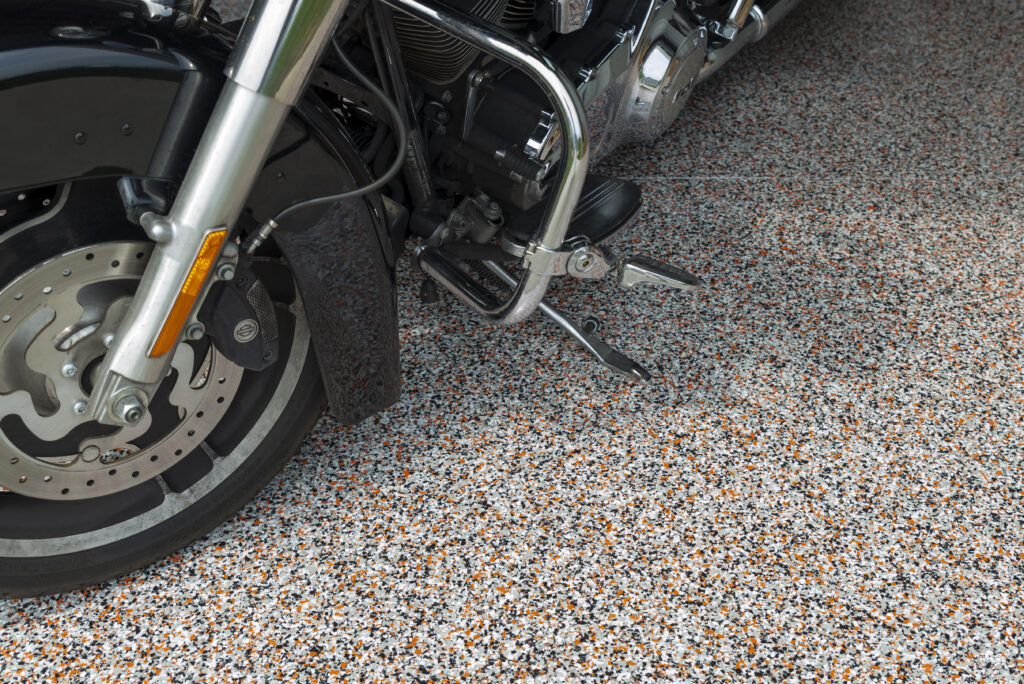
Our design team helps you visualize every detail before we even open a can.
Maintenance Tips for Longevity
Epoxy floors are low-maintenance, but a little care goes a long way:
- Sweep weekly to prevent dirt abrasion
- Mop monthly with ammonia + water (no soap)
- Avoid dragging heavy equipment
- Use soft tires on hot days
Common Mistakes Homeowners Make
- Skipping prep: Leads to early peeling
- Ignoring moisture: Traps water = disaster
- Using inferior materials: Cheap epoxy isn’t worth the headache
We’ve fixed plenty of DIY fails — call us first, and we’ll save you time, money, and stress.
Is Epoxy Slippery? Safety Features Explained
Uncoated epoxy can be slick, especially when wet. That’s why we always offer anti-slip additives, such as aluminum oxide or silica sand, during installation.
Epoxy vs Polyaspartic: What’s the Difference?
| Feature | Epoxy | Polyaspartic |
|---|---|---|
| Cure Time | 1–3 days | 1 day |
| UV Resistance | Moderate | Excellent |
| Installation Flexibility | Lower temps | Broader range |
| Cost | Lower | Higher |
We often recommend polyaspartic topcoats over epoxy base coats for maximum durability.
Garage Floor Coating Myths — Busted
- “Epoxy is just fancy paint”: False. It’s a chemical bonding agent.
- “I can apply it without prepping”: Nope — prep is essential.
- “It won’t hold up in cold climates”: With proper application, it thrives year-round.
Final Thoughts
If you want a garage floor that’s more than just functional — one that’s beautiful, resilient, and easy to maintain — epoxy coating is the ultimate upgrade. At Prime Concrete Coatings, we treat your space like it’s our own.
Let’s transform your garage into something you’ll actually want to show off. Contact our team today.
FAQs
How long does epoxy garage flooring last?
With professional installation, 10–20 years — even longer with regular maintenance.
Can epoxy be applied over old concrete?
Yes, if it’s structurally sound. We assess and repair damage before applying the coating.
Is epoxy resistant to hot tire pickup?
Yes. Our commercial-grade epoxy resists hot tire marks and wear.
What’s the drying time for epoxy coating?
You can walk on it in 24 hours; drive on it after 72 hours.
Will epoxy hide imperfections in the concrete?
Minor cracks and flaws are concealed, but major damage is repaired beforehand.
Do you offer warranties?
Absolutely — we offer up to a 5-year limited warranty on residential installation.

